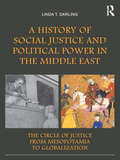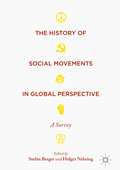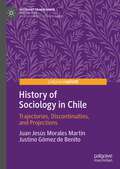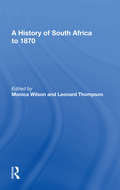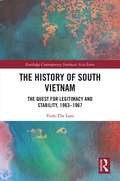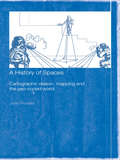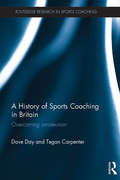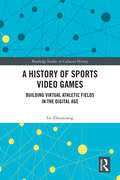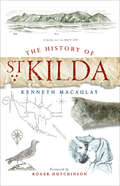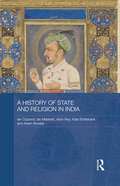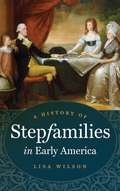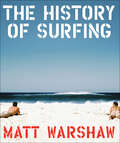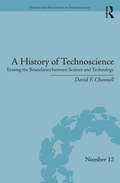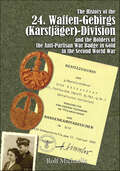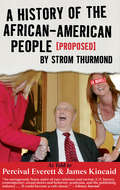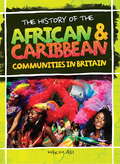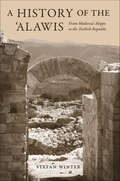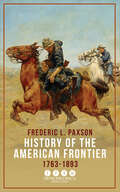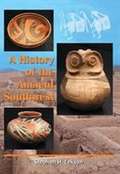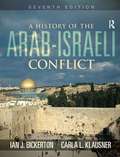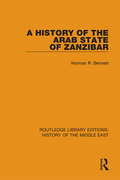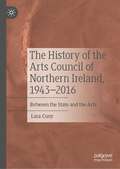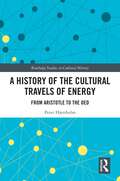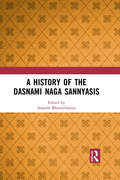- Table View
- List View
A History of Social Justice and Political Power in the Middle East: The Circle of Justice From Mesopotamia to Globalization
by Linda T. DarlingFrom ancient Mesopotamia into the 20th century, "the Circle of Justice" as a concept has pervaded Middle Eastern political thought and underpinned the exercise of power in the Middle East. The Circle of Justice depicts graphically how a government’s justice toward the population generates political power, military strength, prosperity, and good administration. This book traces this set of relationships from its earliest appearance in the political writings of the Sumerians through four millennia of Middle Eastern culture. It explores how people conceptualized and acted upon this powerful insight, how they portrayed it in symbol, painting, and story, and how they transmitted it from one regime to the next. Moving towards the modern day, the author shows how, although the Circle of Justice was largely dropped from political discourse, it did not disappear from people’s political culture and expectations of government. The book demonstrates the Circle’s relevance to the Iranian Revolution and the rise of Islamist movements all over the Middle East, and suggests how the concept remains relevant in an age of capitalism. A "must read" for students, policymakers, and ordinary citizens, this book will be an important contribution to the areas of political history, political theory, Middle East studies and Orientalism.
The History of Social Movements in Global Perspective
by Holger Nehring Stefan BergerSocial movements have shaped and are shaping modern societies around the globe; this is evident when we look at examples such as the Arab Spring, Spain's Indignados and the wider Occupy movement. In this volume, experts analyse the 'classic' and new social movements from a uniquely global perspective and offer insights in current theoretical discussions on social mobilisation. Chapters are devoted both to the study of continental developments of social movements going back to the nineteenth century and ranging to the present day, and to an emphasis on the transnational dimension of these movements. Interdisciplinary and truly international, this book is an essential text on social movements for historians, political scientists, sociologists, philosophers and social scientists.
History of Sociology in Chile: Trajectories, Discontinuities, and Projections (Sociology Transformed)
by Juan Jesús Morales Martín Justino Gómez de BenitoThis book provides a comprehensive overview of the rich and diverse tradition of social thought in Chile over the last century. The authors emphasize the close relationship between sociology and society, and address large issues such as the institutionalization of sociology in the face of an open modernization process following WWII, the key role played by Chile in the regionalization and internationalization of sociology and social sciences in Latin America from the late 1950s until the 1973 Coup d'état, and the radicalization of sociology and the boom of dependency theories during that time. The analysis extends to independent academic centers that kept sociological thought, social intervention and the democratic dream alive within an authoritarian context, and the role of academic and professional sociology since the return to democracy, which has been attentive to accompanying and interpreting the development of a changing Chilean society. Framed within the country's cultural, economic, historical, social and political experience, this overview of the debates, dissemination, networks, and educational programs associated with sociology, will be of interest to students and scholars of Latin American studies and historical sociology.
A History Of South Africa To 1870
by Monica WilsonThis book is aimed towards advancing an understanding of the South African past essential to an appreciation of the South African promise and problems. It presents a survey of the archaeological data, and describes the hunting, herding, and cultivating peoples, and the dominant colonial society.
The History of South Vietnam - Lam: The Quest for Legitimacy and Stability, 1963-1967 (Routledge Contemporary Southeast Asia Series)
by Vinh-The LamThis book provides an in-depth analysis of the political instability of South Vietnam between the two Republics and offers a valuable contribution to the study of the history of Vietnam as it focuses on a decisive period in the history of South Vietnam. A much-needed examination of the political environment of the Republic of Vietnam between 1963-1967, this book shows how South Vietnamese leadership failed to form a stable civilian government and to secure South Vietnam against the increasing threat by North Vietnam. Through a detailed assessment of political difficulties during the period, the book suggests that, to prevent the imminent loss of South Vietnam to the Communist forces, the United States government did not have any other option than to escalate the war by committing its combat ground forces in the South and beginning the sustained bombing in the North. Moreover, the book analyses the administration of General Khánh and Prime Minister Phan Huy Quát and includes a full account of the War Cabinet of General Nguyễn Cao Kỳ. The achievements, the difficulties and the sudden death of the National High Council as well as the confrontation between the Buddhists and the Trần Vãn Hýõng government are also explored. This book will be of interest to researchers and students of the contemporary history of Vietnam, the history of the Republic of Vietnam, the Vietnam War and Southeast Asian history and politics.
A History of Spaces: Cartographic Reason, Mapping and the Geo-Coded World
by John PicklesThis book provides an essential insight into the practices and ideas of maps and map-making. It draws on a wide range of social theorists, and theorists of maps and cartography, to show how maps and map-making have shaped the spaces in which we live.Going beyond the focus of traditional cartography, the book draws on examples of the use of maps from the sixteenth century to the present, including their role in projects of the national and colonial state, emergent capitalism and the planetary consciousness of the natural sciences. It also considers the use of maps for military purposes, maps that have coded modern conceptions of health, disease and social character, and maps of the transparent human body and the transparent earth.
A History of Sports Coaching in Britain: Overcoming Amateurism (Routledge Research in Sports Coaching)
by Dave Day Tegan CarpenterAt the London Olympics in 2012 Team GB achieved a third place finish in the medals table. A key factor in this achievement was the high standard of contemporary British sports coaching. But how has British sports coaching transitioned from the amateur to the professional, and what can the hitherto under-explored history of sports coaching in Britain tell us about both the early history of sport and about contemporary coaching practice? A History of Sports Coaching in Britain is the first book to attempt to examine the history of British sports coaching, from its amateur roots in the deep nineteenth century to the high performance, high status professional coaching cultures of today. The book draws on original primary source material, including the lost coaching lives of key individuals in British coaching, to trace the development of coaching in Britain. It assesses the continuing impact of the nineteenth-century amateur ethos throughout the twentieth century, and includes important comparisons with developments in international coaching, particularly in North America and the Eastern Bloc. The book also explores the politicisation of sport and the complicated interplay between politics and coaching practice, and illuminates the origins of the structures, organisations and philosophies that surround performance sport in Britain today. This book is fascinating reading for anybody with an interest in the history of sport, sports coaching, sports development, or the relationships between sport and wider society.
A History of Sports Video Games: Building Virtual Athletic Fields in the Digital Age (Routledge Studies in Cultural History)
by Lu ZhouxiangThis book explores the history of sports and sports-themed video games, providing a comprehensive and holistic view of this complex and diverse genre.The author highlights the influence of technological advancement, industry competition and popular culture on game design, marketing strategies and user experience. Offering valuable insights into the historical process of interaction and integration between real-world sport and video games, this volume will enrich existing scholarship on video games.This volume is a valuable contribution to the fields of both game studies and sports studies, and will be perfect for those interested in the history of science and technology as well as social and cultural history.
The History of St. Kilda
by Kenneth MacaulayThis classic 18th-century account of the remote Scottish archipelago is a &“beautifully written . . . hugely important piece of social history&” (Scottish Field). As one of the most remote corners of the British Isles, the island archipelago of St Kilda has long held a fascination for travelers from mainland Britain and beyond. Its inhabitants&’ unique culture and way of life has generated an enormous amount of literature for well over a century. Kenneth Macaulay's book, based on his visit to St. Kilda in 1763, is one of the most significant works ever written about the islands. At the time of Macauley&’s visit, St. Kilda&’s population had dwindled to just eighty-eight. His vivid descriptions of the islanders offer rare insight into their living conditions. Macaulay also offers a wealth of information about the animals and birds found there. He writes about the sheep and cattle, and above all the wildfowl, which were used for numerous purposes, including oil, shoes and medicine, and food.
A History of State and Religion in India (Routledge Studies in South Asian History)
by Ian Copland Ian Mabbett Asim Roy Kate Brittlebank Adam BowlesOffering the first long-duration analysis of the relationship between the state and religion in South Asia, this book looks at the nature and origins of Indian secularism. It interrogates the proposition that communalism in India is wholly a product of colonial policy and modernisation, questions whether the Indian state has generally been a benign, or disruptive, influence on public religious life, and evaluates the claim that the region has spawned a culture of practical toleration. The book is structured around six key arenas of interaction between state and religion: cow worship and sacrifice, control of temples and shrines, religious festivals and processions, proselytising and conversion, communal riots, and religious teaching/doctrine and family law. It offers a challenging argument about the role of the state in religious life in a historical continuum, and identifies points of similarity and contrast between periods and regimes. The book makes a significant contribution to the literature on South Asian History and Religion.
A History of Stepfamilies in Early America
by Lisa WilsonStepfamilies are not a modern phenomenon, but despite this reality, the history of stepfamilies in America has yet to be fully explored. In the first book-length work on the topic, Lisa Wilson examines the stereotypes and actualities of colonial stepfamilies and reveals them to be important factors in early United States domestic history. Remarriage was a necessity in this era, when war and disease took a heavy toll, all too often leading to domestic stress, and cultural views of stepfamilies during this time placed great strain on stepmothers and stepfathers. Both were seen either as unfit substitutes or as potentially unstable influences, and nowhere were these concerns stronger than in white middle-class families, for whom stepparents presented a paradox.Wilson shares the stories of real stepfamilies in early New England, investigating the relationship between prejudice and lived experience, and, in the end, offers a new way of looking at family units throughout history and the cultural stereotypes that still affect stepfamilies today.
The History of Surfing
by Matt WarshawThis in-depth, photo-packed look at the history and culture of surfers is “meticulously researched, smartly written . . . required reading” (Outside Magazine).Matt Warshaw knows more about surfing than any other person on the planet. After five years of research and writing, Warshaw, a former professional surfer and editor of Surfing magazine, has crafted an unprecedented, definitive history of the sport and the culture it has spawned. With more than 250 rare photographs, The History of Surfing reveals and defines this sport with a voice that is authoritative, funny, and wholly original. The obsessive nature of Warshaw’s endeavor is matched only by the obsessive nature of surfers, who are brought to life in this book in many tales of daring, innovation, athletic achievement, and the offbeat personalities who have made surfing history happen.“The world’s most comprehensive chronicler of the surfing scene.” —Andy Martin, The Independent
A History of Technoscience: Erasing the Boundaries between Science and Technology (History and Philosophy of Technoscience)
by David F. ChannellAre science and technology independent of one another? Is technology dependent upon science, and if so, how is it dependent? Is science dependent upon technology, and if so how is it dependent? Or, are science and technology becoming so interdependent that the line dividing them has become totally erased? This book charts the history of technoscience from the late nineteenth century to the end of the twentieth century and shows how the military–industrial–academic complex and big science combined to create new examples of technoscience in such areas as the nuclear arms race, the space race, the digital age, and the new worlds of nanotechnology and biotechnology.
The History of the 24. Waffen-Gebirgs (Karstjäger)-Division: and the Holders of the Anti-Partisan War Badge in Gold in the Second World War
by Rolf MichaelisDetailed look into the brutal anti-partisan warfare in Yugoslavia during WWII
A History of the African-American People (Proposed) by Strom Thurmond, as told to Percival Everett & James Kincaid (A Novel): A Novel
by James Kincaid Percival EverettPraise for Percival Everett:"If Percival Everett isn't already a household name, it's because people are more interested in politics than truth."--Madison Smartt Bell, author of The Washington Square Ensemble"Everett's talent is multifaceted, sparked by a satiric brilliance that could place him alongside Richard Wright and Ralph Ellison . . ."--Publishers Weekly"I think Percival Everett is a genius. I've been a fan since his first novel. He continues to amaze me with each novel--as if he likes making 90-degree turns to see what's around the corner, and then over the edge . . . He's a brilliant writer and so damn smart I envy him."--Terry McMillan, author of MamaA fictitious and satirical chronicle of South Carolina Senator Strom Thurmond's desire to pen a history of African-Americans--his and his aides' belief being that he has done as much, or more, than any American to shape that history. An epistolary novel, The History follows the letters of loose cannon Congressional office workers, insane interns at a large New York publishing house and disturbed publishing executives, along with homicidal rival editors, kindly family friends, and an aspiring author named Septic. Strom Thurmond appears charming and open, mad and sure of his place in American history.Percival Everett is the author of 15 works of fiction, among them Glyph, Watershed and Frenzy. His most recent novel, Erasure, won the Hurston/Wright Legacy Award and did little to earn him friends.James Kincaid is an English professor at the University of Southern California and has written seven books in literary theory and cultural studies. These books and Kincaid himself have gradually lost their moorings in the academic world, so there was nothing left for him to do but to adopt the guise of fiction writer. Writing about madness comes easy to him.
The History Of The African & Caribbean Communities In Britain (The History Of #1)
by Hakim AdiDiscover the fascinating history of African and Caribbean communities in Britain, from pre-Roman times to the 21st Century.Newly updated, The History of African and Caribbean Communities in Britain explores why people came to Britain, the problems they faced and the contributions these communities have made to British society. Brought to life with case studies and rarely published photographs, this is an opportunity to get up close to the experiences and vital impact African and Caribbean people have had in Britain. Meet pioneers such as Olaudah Equiano and Phyllis Wheatley and find out why African and Caribbean communities have been fundamental to Britain's success on the world stage. Written by British historian and academic Prof. Hakim Adi, a specialist on the history of Africa and the African diaspora, this book is essential reading for children aged 11+ and anyone interested in learning about the history of these communities in Britain.
A History of the 'Alawis: From Medieval Aleppo to the Turkish Republic
by Stefan WinterThe ‘Alawis, or Alawites, are a prominent religious minority in northern Syria, Lebanon, and southern Turkey, best known today for enjoying disproportionate political power in war-torn Syria. In this book, Stefan Winter offers a complete history of the community, from the birth of the ‘Alawi (Nusayri) sect in the tenth century to just after World War I, the establishment of the French mandate over Syria, and the early years of the Turkish republic. Winter draws on a wealth of Ottoman archival records and other sources to show that the ‘Alawis were not historically persecuted as is often claimed, but rather were a fundamental part of Syrian and Turkish provincial society.Winter argues that far from being excluded on the basis of their religion, the ‘Alawis were in fact fully integrated into the provincial administrative order. Profiting from the economic development of the coastal highlands, particularly in the Ottoman period, they fostered a new class of local notables and tribal leaders, participated in the modernizing educational, political, and military reforms of the nineteenth century, and expanded their area of settlement beyond its traditional mountain borders to emerge from centuries of Sunni imperial rule as a bona fide sectarian community. Using an impressive array of primary materials spanning nearly ten centuries, A History of the ‘Alawis provides a crucial new narrative about the development of ‘Alawi society.
History of the American Frontier: 1763–1893
by Frederic L. PaxsonThough several historians had published works on America's westward expansion prior, Paxson's Pulitzer Prize winning study was groundbreaking in its complete and unified presentation. Beginning with a survey of the frontier at the end of the French and Indian War and proceeding to follow the frontier westward until the close of the period of settlement in about 1890, Paxson's cross-sectional method carries the narrative in a wide windrow of detail, serving as a detailed and scholarly synthesis of the fragmentary work of previous historians. An essential title for any study of American history.
A History Of The Ancient Southwest
by Stephen LeksonAccording to archaeologist Stephen H. Lekson, much of what we think we know about the Southwest has been compressed into conventions and classifications and orthodoxies. This book challenges and reconfigures these accepted notions by telling two parallel stories, one about the development, personalities, and institutions of Southwestern archaeology and the other about interpretations of what actually happened in the ancient past. <P><P>While many works would have us believe that nothing much ever happened in the ancient Southwest, this book argues that the region experienced rises and falls, kings and commoners, war and peace, triumphs and failures. <P><P>In this view, Chaco Canyon was a geopolitical reaction to the "Colonial Period" Hohokam expansion and the Hohokam "Classic Period" was the product of refugee Chacoan nobles, chased off the Colorado Plateau by angry farmers. <P><P>Far to the south, Casas Grandes was a failed attempt to create a Mesoamerican state, and modern Pueblo people--with societies so different from those at Chaco and Casas Grandes--deliberately rejected these monumental, hierarchical episodes of their past.
A History Of The Arab-Israeli Conflict (Seventh Edition)
by Ian J. BickertonConcise and comprehensive, A History of the Arab-Israeli Conflict presents balanced, impartial, and well-illustrated coverage of the history of the Arab-Israeli conflict. The authors identify and examine the issues and themes that have characterized and defined the conflict over the past century tying in a twenty-first century perspective. The seventh edition exposes readers to recent events in the Middle East. Altering relations between Israel and neighboring states, political and religious uncertainty as a result of the Arab Spring and the increased scrutiny of Iran's nuclear program are explored in this updated edition.
A History of the Arab Peoples
by Albert HouraniFrom the 7th century, the rise of Islam, thru Muslim societies, the Ottoman Age, the European empires, nation-states to the current Arab unity and disunity.
A History of the Arab State of Zanzibar (Routledge Library Editions: History of the Middle East #7)
by Norman R. BennettDuring the late eighteenth and early nineteenth centuries the fertile islands of Zanzibar and Pemba became of central importance to East Africa’s growing contact with the international economy as the ruling dynasty encouraged trade in cloves, slaves and ivory. This book, first published in 1978, provides an account of the history of Zanzibar from those early days of trade up to independence and the Revolution that removed the Arab ruling class in 1964.
The History of the Arts Council of Northern Ireland, 1943–2016: Between the State and the Arts
by Lara CunyThis book presents the history of the Council for the Encouragement of Music and the Arts (CEMA) in Northern Ireland from its conception in 1943, and its successor organisation, the Arts Council of Northern Ireland (ACNI). Exploring the political and social impact of cultural policy in Northern Ireland, the book illustrates how the arts developed during the twentieth century and sheds light on the relationship between politics and culture. The author takes a closer look at the responsibilities of ACNI, and examines its interaction with the unionist government, which sought to influence how the organisation distributed its grants. Spanning the outbreak of the Troubles in the 1960s and the Peace Process in the 1990s, the ACNI evolved through a period of conflict and change, and therefore this book argues that there was an undeniable link between the changing political environment and the management of the arts in Northern Ireland. The arm’s length principle is analysed in relation to ACNI, examining the influence that the state had upon its management and governance. Offering a unique historical overview of the arts in Northern Ireland, this interdisciplinary book fills a gap in Irish history and presents insights into cultural policy, conflict resolution and political history.
A History of the Cultural Travels of Energy: From Aristotle to the OED (Routledge Studies in Cultural History)
by Peter HjertholmThis book offers a cultural history of the travels of energy in the English language, from its origins in Aristotle’s ontology, where it referred to the activity-of-being, through its English usage as a way to speak about the inherent nature of things, to its adoption as a name for the mechanics of motion (capacity for work). A distinguished literature deals with energy as matter of science history. But this literature fails to adequately answer a historical question about the rise of the science of energy: How did the commonplace word ‘energy’ end up becoming a concept in science? This account differs in important ways from the history of the word in the Oxford English Dictionary. Discovering the origins and early travels of energy is essential for understanding how the word was borrowed into physics, and therefore a cultural history of energy is a necessary companion to the science history of the term. It is important that modern scholars in a variety of fields be aware that energy did not always have a scientific content. The absence of that awareness can lead to, have led to, anachronistic interpretations of energy in historical sources from before the 1860s. A History of the Cultural Travels of Energy will be useful for those interested in the history of science and technology, cultural history, and linguistics.
A History of the Dasnami Naga Sannyasis
by Ananda BhattacharyyaOrganized Naga military activity originally flourished under state patronage. During the latter half of the sixteenth century and the early part of the seventeenth century, a number of bands of fighting ascetics formed into akharas with sectarian names and identities.The Dasnami Sannyasis constitute perhaps the most powerful monastic order which has played an important part in the history of India. The cult of the naked Nagas has a long history. The present volume aims to explore new findings which are available in various archives and repositories in order to fill up the lacuna in Jadunath Sarkar’s work on the subject as elaborated in the present introduction. Please note: Taylor & Francis does not sell or distribute the Hardback in India, Pakistan, Nepal, Bhutan, Bangladesh and Sri Lanka.
